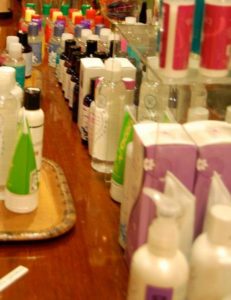Sex educators LOVE lube! Seriously, my people tend to talk about it a lot. After 5 years in this industry, there are still a couple of things I’m surprised to find some confusion about. Today we’re going to talk about 3 things I wish everyone knew about the slippery stuff.
“Readily Available” ≠ “Simple”, “Basic” or “Safe”
One of the things I hear alarmingly often in my life as a sex educator/lube proselytizer is “I’ve had problems with that stuff. Even plain old [horrible drug store brand full of stuff I wouldn’t advise anyone put near their vagina] irritates me!” With frightening regularity people try the lube that is most readily available in their drugstore, assuming that must be the simplest thing available, have a bad reaction and decide if that irritated them well something “fancy” definitely would.

Be selective about lube.
Okay, here’s the thing: in sex ed world the “basic” lubricant you’ve seen in the drugstore since you were a kid may have earned itself the nickname “vagina poison” due to the inclusion of ingredients like Glycerin(e), Propylene Glycol, Nonoxynol 9, Chlorhexedine Gluconate, Petroleum Oils, Polyquaternium-15, Benzocaine, Sugars & Sugar Alcohols, and Ureas that can upset the body’s pH, trigger yeast infections and bacterial vaginosis, and even cause skin irritation that can actually leave the user at greater risk for contracting STIs. That said, know that if you are irritated by “basic” drug store lube, it’s probably the product, not you. Be picky when you pick your slick stuff!
There are different kinds of lube and it makes sense to use them for different things!

I can neither confirm nor deny that my nightstand looks like this.
No joke my nightstand currently has 4 different lubricants on it and yes, I use them all. Why? Well let’s go over my roster:
- A Hybrid– Hybrid lube is a water based formula with a touch of silicone. It’s versatile like water based but long-lasting like silicone. This is my most-used option.
- A thick gel water based – Water based lube is by far the most common and readily available, I like a thick gel because of the cushion it provides. I use this when I want a little extra comfort, for anal play, and with toys. Water based lubricant is also where you most often have to be on the look out for irritating ingredients
- Silicone – Silicone lube is a work horse. It lasts and lasts without drying out. I like to put some under other lubes so that I never completely dry out – seriously, the ultimate in lube luxury is a layer of silicone with a layer of a nice thick gel over it. Interestingly, I actually have some silicone in every room of my house because it’s strangely versatile- I put it in my hair for styling, I use it to keep my elliptical machine from squeaking, it’s good stuff.
- Oil based– Oil based lube doesn’t get enough love. Now it’s true, you cannot use it with latex or polyisoprene condoms and most oils don’t play well with vaginas but there are many external or anal activities it is great for and nitrile, resin, or polyurethane barriers can all be used with oil based formulas. It is my favorite thing to use for hand jobs.
You don’t have to “need” lube for it to make EVERYTHING better!

“Sex without lube is like a slip n’ slide without water”
Something I apparently said a couple of years ago that keeps turning up online is “sex without lube is like a slip n’ slide without water” There’s this weird ego thing with lubricant. People love to assure sex educators that they don’t “need” it. Here’s the thing: even if you don’t “need” it, even if you or your partner has a niagara-esque vagina that lubricates at the merest mention of sex, lubricant makes stuff feel better. What stuff you ask? Stuff when hands touch genitals, stuff with toys, stuff with butts (remember, they don’t lubricate), even stuff with that super-lubricated vagina, which might not feel so wet after you’ve been at it for a while. Trust me on this: Lube 👏 Makes 👏 EVERYTHING 👏 Better 👏.
This post contains a link sponsored by LubeZilla. The opinions in it are, as always, my own.







